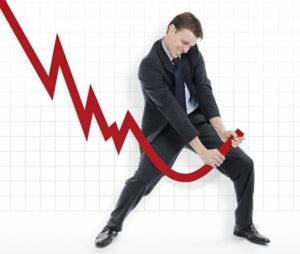
Over the past year, the market has continued one of its most successful periods in history, with a bull run that’s almost a decade old showing little sign of coming to an end.
At least, that’s what investors had been thinking before a recent multi-day decline — including the biggest single-day nominal decline by the Dow Jones Industrial Average (DJINDICES: ^DJI) on Feb. 5 — stoked fears that the worst is yet to come. And eventually, those folks will be right, though it remains to be seen whether the immediate sell-off will continue in the coming days. After all, the market is unpredictable and often erratic in the short term.
So instead of trying to call the market top, smart investors simply make sure they’re ready to act on a market slump by knowing where they plan to invest. Three stocks that our investors particularly like for the next market crash are Google parent company Alphabet Inc (NASDAQ: GOOGL)(NASDAQ: GOOG), TJX Companies Inc (NYSE: TJX), and Mastercard Inc (NYSE: MA).
Think you’ll be ready to get greedy when the market turns fearful? Keep reading to learn what makes these three stocks perfect targets to load up on when the next crash happens.
A business that’s built for bargain-hunters (and perfect for recessions)
Adam Levine-Weinberg (TJX Companies): This off-price retail giant is a solid stock choice for investors who want to sleep well at night. The company has increased its comparable-store sales for more than 20 consecutive years. That period includes both the bursting of the dot-com bubble and the Great Recession.
This long streak of comp sales growth demonstrates the fundamental strength of TJX’s off-price business model. If economic growth accelerates, TJX should benefit from higher discretionary spending among its core middle-class customer base. If economic growth slows, the company is well-positioned to gain market share by buying high-quality merchandise at deep discounts and passing the savings along to bargain-hunting consumers.
Like many other retailers, TJX posted disappointing third-quarter sales results. However, U.S. retail sales rebounded in a big way during the holiday season. Given that TJX’s quarterly guidance is usually quite conservative, the company probably surpassed its forecast of 1%-2% comp sales growth last quarter.
Despite having two weaker quarters during its recently ended 2018 fiscal year (the first and third quarters), TJX expects adjusted earnings per share to rise 8% to $3.80-$3.82. Looking ahead to fiscal 2019, if TJX returns to a better sales trajectory, it could deliver double-digit organic EPS growth. The recent tax reform bill will boost after-tax profit by an additional 20% or so, driving EPS to $5 or more.
TJX’s management sees room to open more than 1,500 additional stores in the coming years — and that ignores the possibility of expanding to new markets or rolling out any of the company’s new concept stores more broadly. In light of these massive growth opportunities, TJX stock looks like a bargain at its current valuation. If the market crashes, it will be even more attractive.
Buy this dominant company whenever it’s on sale
Adam Levy (Alphabet): This company is at the forefront of two big trends: digital advertising and cloud computing.
Google is one of the prime beneficiaries of the fact that consumers — especially young consumers — are watching less TV. As marketers shift their ad budgets from TV to digital, Google still provides one of their best options. In fact, 48% of U.S. senior ad buyers say Google Search has the highest return on investment for their ad dollars, according to a recent survey from Cowen and Company. That’s probably why Google continues to gain share of the growing digital ad market.
In the cloud, Google benefits from its strengths in machine learning. Its AutoML platform makes it easy for any company to take advantage of neural networks to train their own AI. CFO Ruth Porat says Google Cloud is now producing over $1 billion per quarter, and it’s the fastest growing public cloud provider in the market.
Finally, there’s the “bet” part of Alphabet. Companies like Nest, Fiber, and Verily helped narrow the segment’s operating loss last year, but I’m most excited about Waymo, the autonomous car unit. Waymo began a rider program in Phoenix last year, and management plans to expand to more states this year. On top of that, Waymo has the potential to disrupt public transportation and ground delivery — a multibillion-dollar opportunity to say the least.
With so many trends working in Alphabet’s favor, a market crash could create an opportunity to buy at a wonderful price.
Let the short-term fears play to your long-term advantage
Jason Hall (Mastercard Inc): Over the past year, Mastercard shares have absolutely crushed it, up more than 55% in total returns. And over the long term, I think the company has a very good chance at continuing to outpace the market as a bigger share of global transactions move away from cash. With one of the biggest secure transaction networks in the world, a strong and trusted brand, and relationships with millions of merchants and financial institutions around the world, Mastercard is set for years of growth.
And while the business has delivered excellent results over the past year, the stock looks like it may have gotten a little ahead of itself, trading for 36 times last year’s earnings. That’s not so expensive that I think it’s a sell — to the contrary, this is a cornerstone “hold forever” investment in my own portfolio — but the high valuation could cause its price to fall even further than the rest of the market during a crash.
I don’t know when the next crash will happen, but I do know that Mastercard is at the top of my personal list of stocks to load up on when it does.


